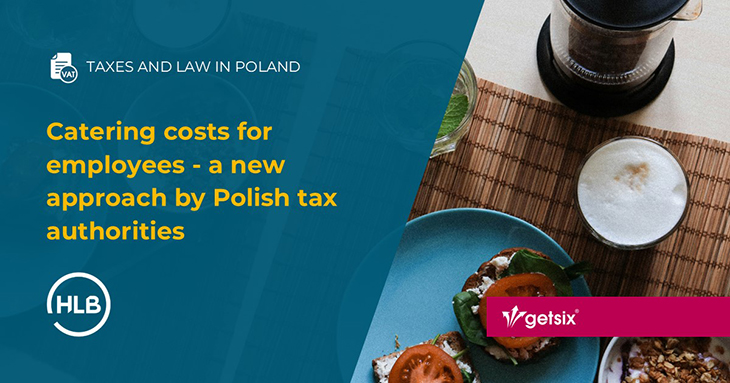Catering costs for employees – a new approach by Polish tax authorities
Major changes in the position of Polish tax authorities on the financing of catering costs. The National Revenue Administration (Krajowa Administracja Skarbowa, or KAS) in Poland has recently liberalized its approach and changed the interpretation of regulations in favour of taxpayers. According to the new interpretation, an employer may now include expenses related to catering not only for employees but also for individuals collaborating with the company under civil law contracts. Therefore, the type of contract connecting the person with the employer no longer matters in terms of deductible costs.
This updated interpretation results from a request by an IT company seeking guidance on the tax treatment of food services provided to staff, especially those collaborating under civil law contracts as part of their sole proprietorship activities.
The company explained that these collaborators, like full-time employees, can use common areas of the office facilities, including the kitchen stocked with snacks and beverages, and get sandwiches or lunch sets during meetings and training sessions. The company argued that such practices help establish better cooperation and, in their opinion, should be standard in the employer-employee relationships. The company then asked the KAS whether it can include catering expenses for all employees and associates in the tax-deductible costs.
Catering costs deductible? Change of KAS in the interpretation of the regulations
On October 11, 2024, the head of the National Revenue Administration, Marcin Łoboda, issued a ruling (Interpretation No. DOP4.8221.8.2021.CPXV), stating that tax regulations in Poland do not prohibit the deduction of catering costs. These can be counted as tax-deductible costs regardless of whether they concern to employees or co-workers.
“Expenditures incurred for food products described in the factual circumstances presented in the request, whether concerning ‘employees’ or ‘co-workers,’ meet the requirements for classification as tax-deductible costs under Article 15, Section 1 of the Corporate Income Tax Act (CIT) and bear a causal link with the taxpayer’s activities. The food-related expenditures incurred by the company are not included in the closed list of non-deductible expenses outlined in Article 16, Section 1 of the CIT Act (similarly, Article 23, Section 1 of the PIT Act),” emphasized the head of KAS. “These expenses, in particular, cannot be classified as representation expenses as defined by Article 16, Section 1, Point 28 of the CIT Act.”
This is a complete change in the tax office’s approach. Let us recall that in the June 2020 interpretation (No. 0111-KDIB2-1.4010.119.2020.1.AM), the director of the National Tax Information (KIS) had only agreed to deductions for food purchases solely for employees under employment contracts. At that time, expenses related to co-workers under civil law contracts were considered merely as representation expenses and therefore non-deductible.
Catering and tax-deductible costs. What about integration events?
Experts highlight that the new position of the tax office is a step in the right direction, as the previous requirement for employers to identify the portion of refreshments consumed by employees versus collaborators was unfeasible in practice. This prior approach constituted an additional difficulty on companies, forcing them to allocate refreshment costs depending on the contracts between them and individuals.
They also emphasize that this new interpretation should be extended to cover integration events. Currently, Polish tax authorities still permit only certain expenses (excluding alcohol) to be deductible, provided they are strictly related to employees, board members, and other individuals in management roles—but not to co-workers.
This updated interpretation by Polish tax authorities represents a notable shift towards simplification in tax practices and reflects an evolving understanding of workplace realities in Poland.
If you have any questions regarding this topic or if you are in need for any additional information – please do not hesitate to contact us:
CUSTOMER RELATIONSHIPS DEPARTMENT

ELŻBIETA
NARON-GROCHALSKA
Head of Customer Relationships
Department / Senior Manager
getsix® Group
***














